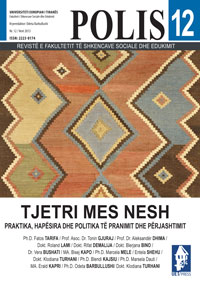Udhëtimi i teorive neoliberale në fushën e zhvillimit urban në vendet postsocialiste. Rasti shqiptar
Travel of neo-liberal theories in the area of urban development in post-socialist countries: The case of Albania
Author(s): Marcela Mele, Entela ShehuSubject(s): Social Theory, Rural and urban sociology, Economic development, Transformation Period (1990 - 2010)
Published by: Shtëpia botuese “UET Press”
Keywords: "Travel theory"; post-socialist countries; the region-Tirana; development (sub) urban; private property;
Summary/Abstract: The neo-liberal discourse has dominated policy analysis in post socialist cities. Said‘s (1983) “travel theory” opens up a crucial research agenda, which establishes the displacements of ideas in different cultural or national sites as an important aspect of the production of knowledge. Drawing from Said‘s “travel theory” Smith (2006) suggests that theories of transition have travelled at different paces in different post socialist countries. This principle can be applied to the situation in Albania, which continues to defy a straightforward translation of Western urban theory to an understanding of the local context. Albania provides a good example of two aspects of “travelling urban theory”: (1) the transfer of “good practice” models of urban governance and (2) the application of Anglo-American urban theories to knowledge of changing spaces of governance and suburban development in the Tirana city region. Focusing on the analysis of suburban development in the Tirana city region, this paper examines in what ways can, or should, “travelling urban theory” be grounded in the evolving complexities and contradictions of urban life in the Tirana city region. Specifically it considers the relevance of urban theories developed by British and American scholars of urban development for transitional urban economies. Enacting the transfer of theory from one context to another represented a challenge for the first author, who is an Albanian scholar doing PhD research in the UK, but also for the second one who saw its implementation on the ground. While some theoretical concepts were helpful in contextualizing the situation in Albania, we propose that western theory does not “fit” well within the context of understanding processes of suburban development in Tirana. We examine two contexts where travelling urban theory collided with local knowledge on the ground and consequently led to a modification of conceptual themes. These were, respectively, (a) knowledge of local livelihood strategies and (b) local property knowledge.
Journal: Polis
- Issue Year: 2013
- Issue No: 12
- Page Range: 79-95
- Page Count: 17
- Language: Albanian

